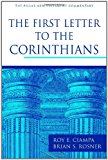The First Letter to the Corinthians. The Pillar New Testament Commentary. By Roy E. Ciampa and Brian S. Rosner. Grand Rapids: William B. Eerdmans Publishing Company, 2010. 922 pp. Cloth, $65.00.
First Corinthians is a book that is of great interest to Free Grace people because this epistle was written to a very immature church, yet Paul refers to them as saints and recipients of the Spirit. This epistle has two key passages on the Be„ma (1 Cor 3:10-15; 9:24-27) and it deals with many problems faced in contemporary churches as well (divisions, immorality, taking one another to court, misuse of spiritual gifts, etc.).
The authors do not skimp on the discussion of any verse, giving an average of two pages of discussion for each. Key texts, like 1 Cor 6:9-11, receive even more attention (Ciampa and Rosner give eight pages on those three verses, pp. 237-45).
However, the authors do not hold to the Free Grace position. Their discussion of 1 Cor 5:5 and 6:9-11 makes this clear. Regarding the former they say, “those who persist in flagrant sin have no future with God…future salvation is not a forgone conclusion for any who claim to be fellow believers but are sexually immoral” (p. 209). Concerning the later they write, “assurance of salvation depends in part on ethical progress; cf. 6:11: ‘that is what some of you were’” (p. 209, italics his). The authors see 1 Cor 6:9-11 as “a thinly veiled threat…[that] those guilty of such sins will not inherit the kingdom” (p. 243). Ciampa and Rosner assume this refers to obtaining what they call “future salvation” and that those who do not inherit the kingdom will be eternally condemned. They seem unaware of the rewards interpretation.
However, the authors have much discussion about rewards. In the subject index there is a reference to “reward, wages” which lists 38 pages (144, 148-49, 151, 156-57,160, 174, 282, 349, 402-15, 418-20, 433-34, 437-40, 638, 653, 791, 838-39). And their discussion on rewards is excellent. It is especially good since they appear to have no theological axe to grind on the issue.
For example, concerning reward in 1 Cor 3:14 (as well as in 1 Cor 4:4-5), they write, “Paul is not speaking of salvation as the reward in question…The issue then is not…heaven and hell, but reward or no reward” (pp. 156-57).
Their comments on 1 Cor 9:23 and Paul’s desire to be a partner with the gospel illustrates the value of this commentary. Though they do believe that Paul expressed concerns about his own eternal destiny in 1 Cor 9:24-27 (cf. pp. 435-43), they reject the suggestion of many commentators that Paul is expressing that concern in this verse (p. 432). They see 1 Cor 9:23 expressing the same idea as in Phil 1:5, 7, where similar wording is found.
I highly recommend this commentary for JOTGES readers because it is easy to follow and it has extensive treatment of each and every verse. It also has outstanding indexes. In spite of the fact that it does not represent the Free Grace position, this commentary is well worth owning for the wealth of information it contains.
Robert N. Wilkin
Editor
Journal of the Grace Evangelical Society
Denton, Texas


